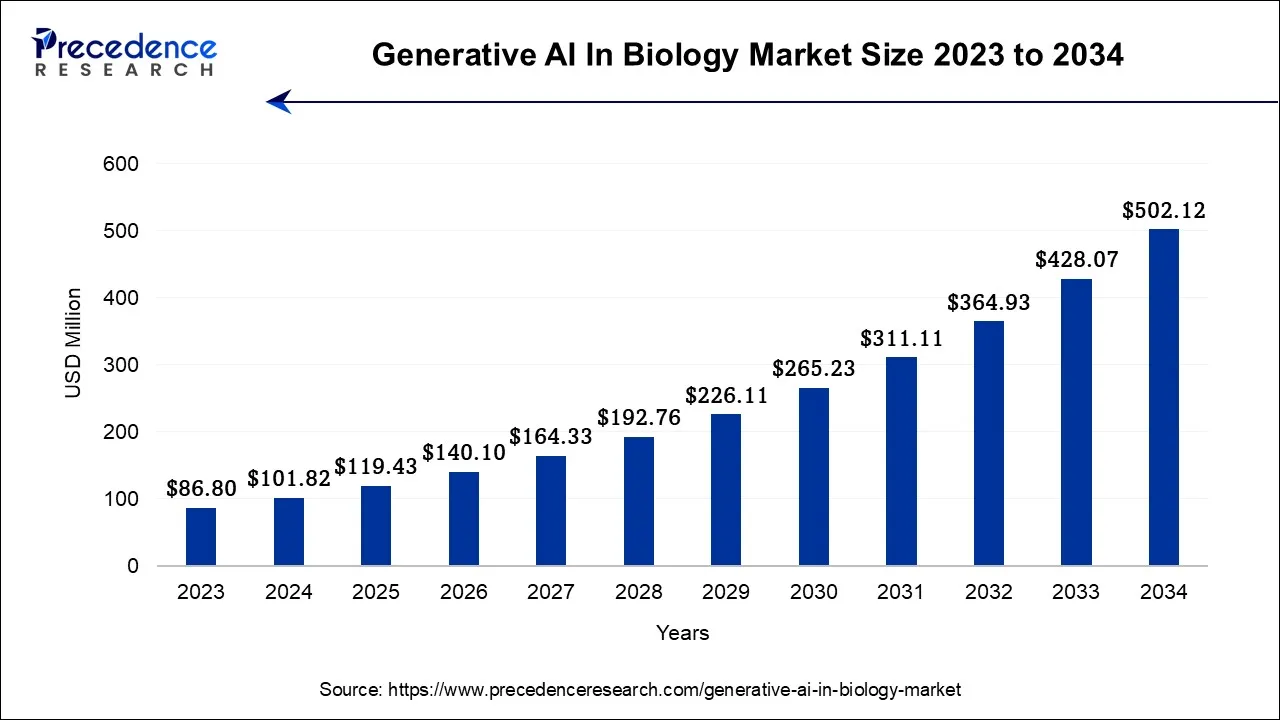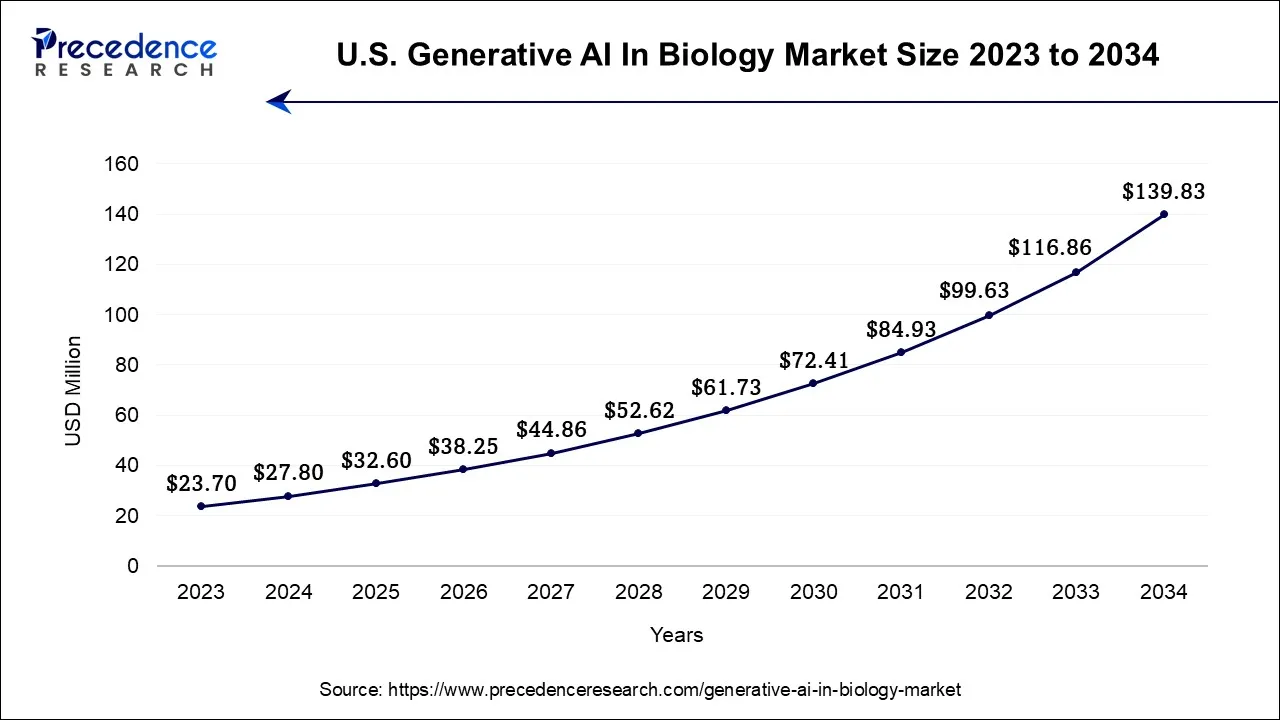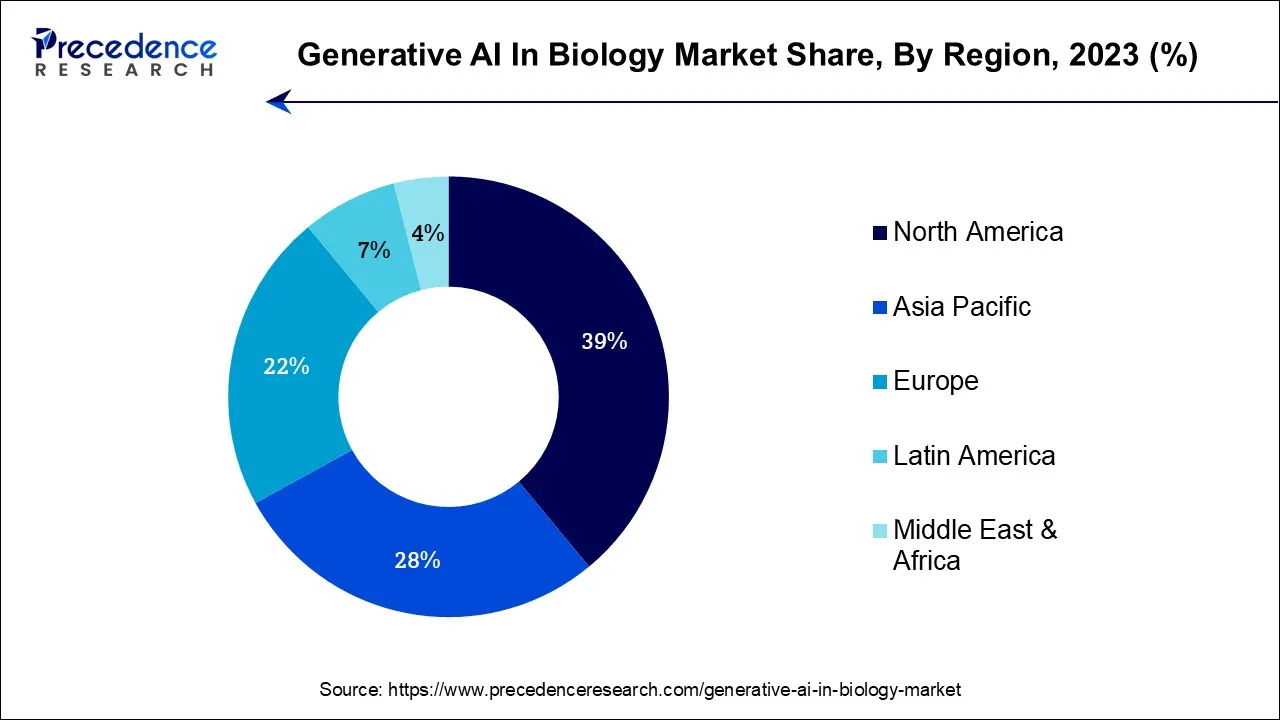January 2025
The global generative AI in biology market size is calculated at USD 101.82 million in 2024, grew to USD 119.43 million in 2025, and is predicted to hit around USD 502.12 million by 2034, poised to grow at a CAGR of 17.3% between 2024 and 2034. The North America generative AI in biology market size accounted for USD 39.71 million in 2024 and is anticipated to grow at the fastest CAGR of 17.45% during the forecast year.
The global generative AI in biology market size is expected to be valued at USD 101.82 million in 2024 and is anticipated to reach around USD 502.12 million by 2034, expanding at a CAGR of 17.3% over the forecast period from 2024 to 2034.

The U.S. generative AI in biology market size is accounted for USD 27.80 million in 2024 and is projected to be worth around USD 139.83 million by 2034, poised to grow at a CAGR of 17.53% from 2024 to 2034.

North America dominated the market in 2023, the region holds the potential to sustain its dominance throughout the forecast period. The region’s dominance in the generative AI in biology market is attributed to the rapid adoption of advanced technologies with the willingness of transformation in the sectors including healthcare, pharmacy and others. Moreover, the rising prevalence of chronic and infectious diseases in the region has forced researchers to adopt technologies that offer accountable, rapid and reliable solutions for faster drug discovery process, this element brings a potential factor for the adoption of generative AI in the region’s industry.
North America boasts a robust ecosystem for research and development, facilitating innovation and knowledge generation. Renowned universities and research institutions in the region conduct cutting-edge research in AI, attracting top talent and fostering collaboration between academia and industry.

Asia Pacific is Expected to Witness Significant Growth in the Market During the Predicted Period
The highly anticipated growth of the market in the region can be driven due to the rising rate of disease along with the rising rate of population across the region. Asia Pacific is home to multiple key players that are involved in the development of AI-based platforms for several end-user industries, thus this factor brings an opportunity for the market to expand in the region. Moreover, ongoing business activities in the form of collaborations and product launches with international players create a significant driver for the market to grow.
Being the most prominent and latest branch of artificial intelligence, generative AI has already started showing its collaboration in multiple industries, including healthcare, pharmaceuticals, automotive and many others. Generative AI is the upgradation in the technology of artificial intelligence which mostly uses technologies such as machine learning and deep learning for understanding existing data and generating new data from it. Deep learning is the technology in which the generative models are trained on an extensive database and after that, it will be as create or generate output data like audio, images, and text.
Generative AI in biology revolves around the development of the infrastructure with the presence of advanced solutions, specially designed for drug discovery, drug assessment, etc. Generative AI uses machine learning technology or algorithms to generate the latest data from the existing one. Generative AI in biology works in utilizing to generate new biological entities and stimulates complex biological processes. The increasing need for advanced technologies in the healthcare infrastructure will drive the growth of generative AI in the biology market during the forecast period.
Generative AI helps in many forms in the biological process such as drug discovery, image analysis, personalized medicines, predictive modeling, and synthetic biology. Furthermore, generative AI could help in the drug discovery process by minimizing the cost of the drug by developing new molecules with specified properties for drug development. Generative AI can be helpful in personalized medicine for the patient by analyzing and patient's medical records and genomics.
Generative AI is beneficial for analyzing large biological datasets which includes data generation, data compression, data visualization, anomaly detection, and dimensionality reduction. Generative AI can generate synthetic data by using augmented existing datasets. The emphasis on improved drug discovery and improvement in the patient outcomes can be achieved with generative AI solutions. These factors overall act as growth elements for the expansion of the market.
| Report Coverage | Details |
| Market Size in 2024 | USD 101.82 Million |
| Market Size by 2034 | USD 502.12 Million |
| Growth Rate from 2024 to 2034 | CAGR of 17.3% |
| Largest Market | North America |
| Base Year | 2023 |
| Forecast Period | 2024 to 2034 |
| Segments Covered | By Application, By Technology, and By End-Use |
| Regions Covered | North America, Europe, Asia-Pacific, Latin America, and Middle East & Africa |
Drug discovery has traditionally entailed laborious and time-consuming screens to find possible compounds in a library that have the desired effect, such as killing bacterial cells in the case of an antibiotic. In recent years, overall biotechnology and pharmaceutical sectors have started showing active participation towards the adoption of advanced services and solutions in the form of technology to improve the quality of outcomes. There are multiple obvious benefits of these technologies; time and money are not wasted on substances that are unlikely to produce the intended results.
Artificial intelligence is one of the most prominent and widely utilized in the industry for predicting the success of molecules. AI can assist in the production of new compounds, which could significantly improve the discovery and creation of new, potent medications. AI can replace tedious chores while determining a medicine's effectiveness during the drug discovery process. Thereby, the factor is expected to drive the growth of the market while promoting the adoption of generative AI models and solutions in the overall pharmaceutical industry, especially for drug delivery.
Multiple companies across the globe have already initiated the utilization of generative AI models, while recognizing the potential of generative AI in revolutionizing drug discovery. For instance, Insilico Medicine has already designed an AI-based platform to accelerate the generation of novel molecules. On the other hand, in March 2023, Adoptyv Bio developed a platform with generative AI models in order to accelerate protein engineering. These platforms are observed to improve the overall procedure of drug discovery.
Biological data can be diverse in nature and often be more complex, which makes it difficult to develop a generative AI model which efficiently captures the primary relationship and patterns. Additionally, biological data severally contain variability which will lead to hampering the accuracy of the generative AI models. Such issues can severely affect the overall desired results by hampering the user’s trust in AI platforms, which can limit the adoption of generative AI solutions in the industry. Thus, the element is observed to act as a major restraint for the market.
The rising demand for faster prediction of protein structure presents a significant opportunity for the market. Determining the three-dimensional structure of proteins is crucial for understanding their functions and designing targeted drugs. Generative AI models can help stimulate the process of protein folding, where the linear amino acid sequence attains its native three-dimensional structure. Furthermore, generative AI can aid in predicting the structure of protein structures, generative models can generate plausible predictions for novel protein sequences, saving time and resources.
One of the recent advancements in AI in biology is the technique known as AlphaFold, which predicts protein shapes based on amino acid sequences. AlphaFold is a ground-breaking use of AI that reliably predicts protein structure down to the atomic level even in the absence of homologous protein structures. It achieves this by leveraging multi-sequence alignments in the architecture of the deep learning method and a "neural network" to incorporate knowledge of the physical and biological aspects of protein structure.
The drug discovery and development segment dominated the market in 2023, the segment will continue to sustain its position throughout the forecast period. The utilization of generative AI models and algorithms in drug discovery drives drug development, minimizes the cost of the drug and improves the overall quality of outcomes. Drug discovery is one of the most advanced and complex processes in the medical industry.
Generative AI is highly impacting the growth of drug development while revolutionizing the process of drug discovery in the era where the medical industry requires novel medicinal solutions. Generative AI uses machine learning to develop and sustain the growth of generative AI in drug discovery. Generative AI is observed to be the latest transformative process in the field of drug discovery. Some processes in which generative AI is used in drug discovery include molecule generation, drug design optimization, and de novo drug design.
The medical imaging segment is expected to grow at a significant rate. Generative AI plays an important role in the medical imaging process. Several technologies like variational autoencoders and generative adversarial networks help to promote medical imaging by generative synthetic images, segmentations, improvement in reconstruction, and facilitation of treatment and disease diagnosis planning. Additionally, medical imaging produces an enormous amount of data that needs an expert to analyze to extract meaningful data from it.
The generative adversarial networks segment had a significant share in 2023, the segment is expected to sustain the growth rate during the forecast period. The growth of the segment is attributed to the rising use of generative adversarial network technology in creating realistic images, protein structure presentation, synthetic biology, and drug discovery. The generative adversarial networks are responsible for the extension of digital pathology, generative adversarial network technology is used in processes such as image procession problems such as visual staining, normalization of color, image enhancement, ink removal, segmentation nuclei, automatic feature extraction, and data augmentation.
The variational autoencoders segment is expected to grow at a notable rate during the forecast period. An increase in the use of variational autoencoder technology for the underlying distribution of input data and the creation of new samples is observed to offer a potential to the segment while driving the growth of the segment in the market. variational autoencoders are used for drug design, generating molecular structure, and analyzing genomics data.
The pharmaceutical and biotechnology companies segment dominated the market in 2023, the segment is expected to remain at a prominent position throughout the forecast period. Pharmaceutical and biotechnology companies are widely using generative AI for drug designing, predicting molecular interaction, designing of latest therapeutics molecules, and even in drug development process. Generative AI is increasingly used in the process of pharmaceutical and biotechnology companies such as it gives contribution to data management and cloud computing. There are some uses such as drug discovery, drug repurposing, creating customization medicines, and accelerating drug discovery. Other than drug discovery, generative AI helps to enhance clinical trials and precision medicines.
The healthcare provider segment is expected to grow at a significant rate during the forecast period. The growth of the segment is attributed to the rising use of generative AI in healthcare infrastructure. Generative AI is aimed to help healthcare providers in several forms such as it helps in identifying the disease much earlier and more precisely, creating a personalized treatment plan, and providing virtual health assistance that includes medication reminders. It automates and improves the quality of care of the patients with personalized communication between providers and patients, likewise the chatbots for preliminary triage diagnosis.
Market Segmentation
By Application
By Technology
By End-Use
By Geography
For inquiries regarding discounts, bulk purchases, or customization requests, please contact us at sales@precedenceresearch.com
No cookie-cutter, only authentic analysis – take the 1st step to become a Precedence Research client
January 2025
July 2024
September 2024
January 2025